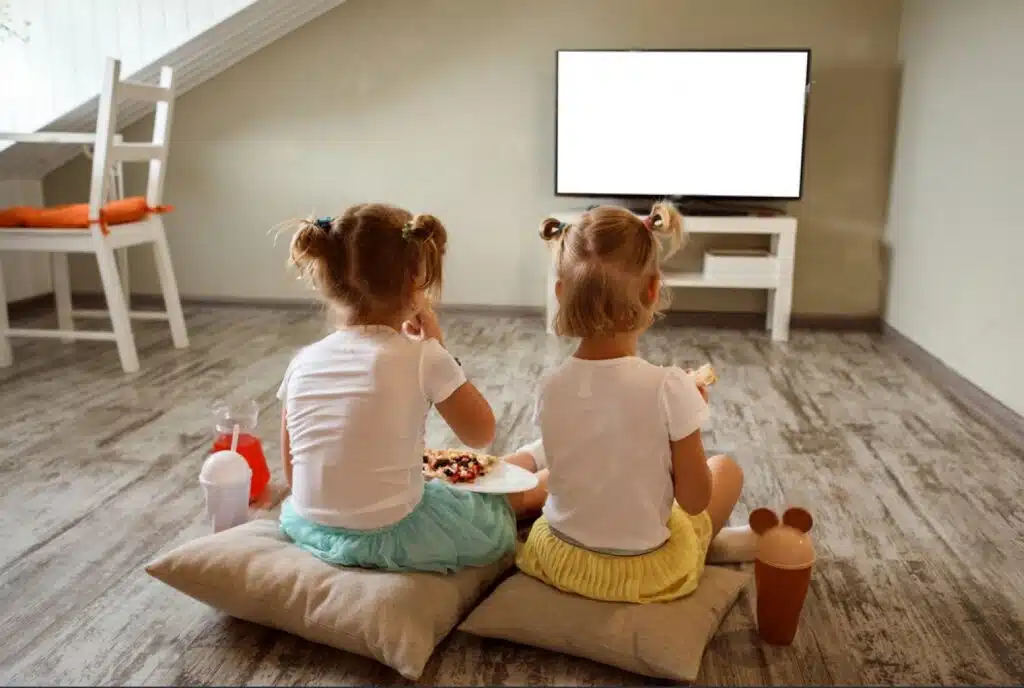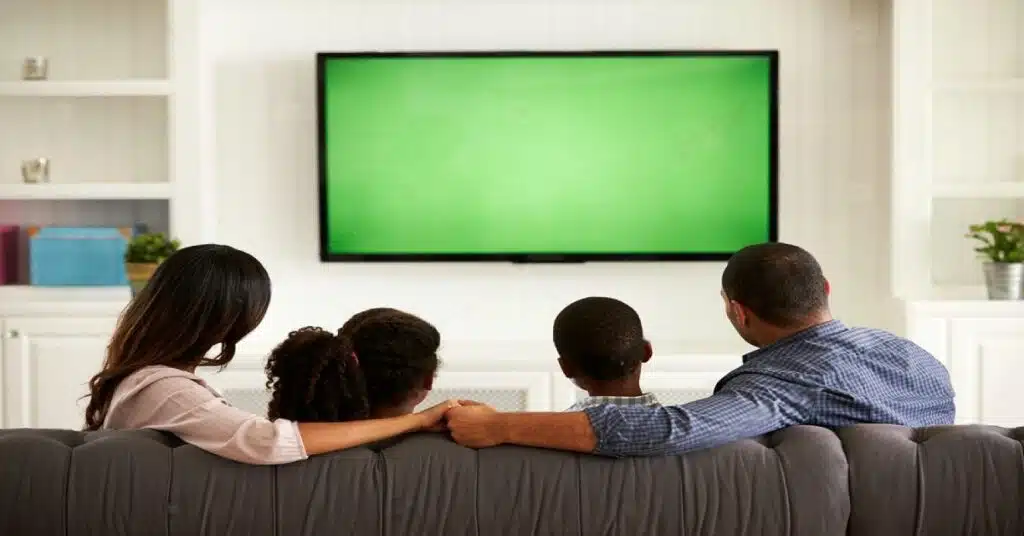
Television has been a staple in households around the world for decades. From news and sports to reality shows and dramas, there’s something for everyone on the small screen. We are providing short and long examples of essay on television for your knowledge.
In this essay on television, we’ll explore both the positive and negative effects of this ubiquitous form of entertainment, drawing conclusions that are sure to challenge your assumptions about what you watch every day.
Essay on Television- 100 Words
Television combines the pleasures of radio and cinema. It has become the most popular means of entertainment as it provides variety of entertainment at minimum cost. Every home has a T.V. nowadays. The facility of cable network has increased the pleasures of television.
Now we have hundreds of channels available to us. Each person can watch programs of his choice. Instant and live coverage of sports items, films and films-based programs, T.V. serials and soap operas are sort of the programs which are liked most.
Television watching is entertaining as well as informative Programs on current affairs enlighten us. However, like every invention of science, T.V. has darker aspects also. Excessive T.V. watching proves harmful. So, let us be moderate in enjoying the pleasures of television.
Also Read:
- Paragraph on Bad Effects of Watching TV
- Essay on Impact of Cinema in Life
- 450 + Amazing Full Forms in Computer
- Essay on Use of Technology in Education
- Essay on New Farm Bill 2020
About Television Essay- 150 Words
Television has become an integral part of our lives, and its undeniable impact encompasses both positive and negative aspects. On the positive side, television serves as a global source of information and news, keeping us informed about events worldwide. It also plays a significant educational role through documentaries and educational programs, offering valuable insights on various subjects. Furthermore, television acts as a platform for cultural exchange, showcasing diverse perspectives and traditions, fostering understanding and appreciation.
However, it is essential to acknowledge the negative aspects as well. Excessive television consumption can lead to addiction and excessive screen time, potentially causing health problems. Additionally, certain types of programming can perpetuate harmful stereotypes and biases, contributing to social issues and misunderstandings.
While television has undoubtedly shaped society, it is crucial for individuals to make conscious decisions regarding their viewing habits and screen time. By being selective about what we watch and mindful of the time we spend in front of the screen, we can maximize the benefits of television while mitigating its potential drawbacks.

Essay about Television- 200 Words
Technology today has taken over our lives in many ways. There is a flood of programs on TV which cater to all age groups. From cartoon channels for kids to daily soaps for adults and news channels for all, there is something for everyone that TV can offer.
In this scenario how can the students be left alone? There is a variety of programs on TV which are educative and can be used as a tool of instruction for students and help them in many ways. From Vedic math to solutions for physics problems, television has programs today on these topics. The amount of time children spend on watching TV is the maximum that they do on anything else. If this time is used productively, it can be very beneficial for students. Certain channels have specific programmers as per the syllabus of specific classes and designed a learner-friendly way. The concepts of chemistry or formulas of mathematics are explained in an effective way. It is a known fact that when children learn through a visual and audio medium, they learn fast and are able to memorize it in a better way.
In this technological world, TV has emerged as an effective tool for learning. TV, when used carefully, can be of great help to all sections of people, especially the students as they get to learn in a friendly and enjoyable environment.
Long Essay on Television- 500 + Words
Television has become an inseparable part of our lives. It’s a source of entertainment, information, and even education. From the beginning of its invention, television has evolved into a powerful tool that shapes our society in various ways.
However, with great power comes great responsibility. The impact of television can be both positive and negative on individuals and society as a whole. In this analytical essay on television, we will explore the history of television, the pros and cons of watching it regularly, responsible use guidelines for parents and children alike, along with its influence on modern society – all to answer the question: Why is TV more than just entertainment? Let’s dive right in.

The history of television
Television, or TV as it’s commonly referred to, has become a ubiquitous presence in modern-day households. However, this wasn’t always the case. The history of television can be traced back to the late 1800s when inventors began experimenting with transmitting images over wires.
In the early 1900s, several inventors made significant strides towards creating a working television system. One such inventor was John Logie Baird who is credited with creating one of the first viable mechanical televisions in 1925.
However, it wasn’t until the 1930s that electronic televisions became widely available. These TVs used cathode ray tubes (CRT) to display images and were much more reliable than their mechanical counterparts.
Throughout the years, advancements in technology have led to countless improvements in television sets – from color displays and remote controls to high-definition screens and smart TVs. Today, we have access to an endless stream of content at our fingertips thanks to streaming services like Netflix and Hulu.
It’s fascinating how far we’ve come since those early experiments with transmitting images over wires!
The impact of television on Children in the Modern Time

Some may argue that television is an excellent tool for education and entertainment, the impact on young minds is profound. Let’s discuss point wise.
Children who spend hours watching TV often have difficulty concentrating in school and tend to develop poor reading habits. Additionally, excessive screen time can reduce physical activity levels and lead to obesity-related health problems.
Furthermore, many programs aimed at children contain explicit content or violent themes that can harm their emotional development. Children exposed to such content may experience anxiety or aggression as they attempt to process what they’ve seen.
However, there are also positive aspects of television viewing for children when done responsibly. Educational shows like Sesame Street provide valuable learning opportunities while also entertaining young audiences. Parents should carefully monitor their child’s TV viewing habits and choose age-appropriate programming.
While television can be a powerful tool for learning and entertainment when used correctly; it can also pose significant risks if not appropriately monitored by adults responsible for the well-being of our youth.
The impact of television on the Society
Television has significantly influenced the way people think, communicate and interact with each other. The impact of television on society is complex and multifaceted.
On one hand, it has brought about positive changes in terms of education, entertainment, and communication. Television programs can educate people on a variety of topics such as science, history and current events. It also provides a platform for creative expression through movies, dramas or documentaries.
However, excessive television watching can contribute to negative effects on social behavior such as violence or desensitization to real-life issues. Some argue that the portrayal of certain groups in television shows perpetuate harmful stereotypes that ultimately affect societal norms.
Moreover, advertising is another aspect where television influences our daily lives which sometimes lead us into unhealthy choices like fast food consumption or unnecessary purchases which we might not need at all.
The impact of television on society depends upon how it’s used by individuals – whether they watch TV responsibly or irresponsibly- making sure not only to limit their screen time but also being conscious about what they’re consuming from this medium
Pros and cons of television

Television comes with its own set of pros and cons. One of the main advantages of television is that it provides entertainment for people who are looking to unwind after a long day at work or school. It also offers educational programming which can help us learn about different cultures, history, science, and more.
On the flip side, excessive watching of television can have negative effects on an individual’s health such as obesity due to being sedentary for extended periods. Additionally, violent content on TV may lead to aggressive behavior among children.
Another disadvantage is addiction – some individuals simply cannot resist the temptation to watch more TV even when they should be doing other things instead. This could eventually lead to feelings of guilt or anxiety over wasted time.
Despite these disadvantages though, we cannot deny that television does offer a lot of benefits as well. As long as we use it responsibly by balancing our time spent watching with physical activity and social interaction outside the screen; then there’s no reason why we can’t enjoy all the good things that come with this technology while minimizing its negative impact on our lives.
How to Use Television Responsibly
Television has become an integral part of our lives, and it is important for us to learn how to use it responsibly. We need to understand that excessive television watching can have negative effects on our health, relationships, and overall well-being. Here are some tips on how you can use television in a responsible manner:
Set limits on the amount of time you spend watching TV each day. Try not to exceed two hours per day. This will allow you enough time to watch your favorite shows without consuming too much of your daily routine.
Choose programs that align with your values and interests while avoiding those which promote negativity or violence in any form.
Be mindful of the content that children are exposed to on TV by choosing appropriate channels and parental controls.
Fourthly, instead of binge-watching multiple episodes or seasons at once try breaking up viewing session into smaller ones throughout the week.
Turn off the TV during dinner time so that you can enjoy quality family time together without any distractions. By following these simple steps we can ensure responsible usage of Television while balancing other aspects of life as well!
Why More Than Entertainment?

Television is no longer just a source of entertainment. It has become an essential part of our lives, providing information and education to people of all ages. With the advent of technology, television has evolved into a multipurpose device that can be used for various purposes.
One reason why television is more than just entertainment is its ability to provide educational content. From documentaries to news programs, there are endless opportunities for viewers to learn about new things and expand their knowledge base.
Another reason why television goes beyond entertainment is its role in shaping cultural attitudes and values. Television shows have the power to influence public opinion on various social issues such as gender roles, race relations, and political ideologies.
In addition, television plays a significant role in keeping people connected with each other and the world at large. News channels provide up-to-date information on global events while talk shows create platforms for discussions on current affairs.
The impact of advertising cannot be ignored when considering why TV means more than mere entertainment. Ads create awareness about products/services while influencing consumer behavior by delivering targeted messages across different demographics segments
It’s evident that Television has transcended from being simply an entertaining tool towards serving multiple functions that impact society positively or negatively depending on how it’s utilized
Analysis on Watching Television
Television has become an essential part of daily life, and it’s almost impossible to imagine our lives without this device. But the question is, how much TV is too much? How does television affect us mentally and physically?
Studies reveal that watching too much TV can lead to obesity in children and adults due to lack of physical activity. Moreover, excessive screen time can also cause sleep disturbances, eye strain, and headaches.
On a mental level, some studies have associated prolonged TV viewing with depression and anxiety. Furthermore, exposure to violent content on TV may lead to aggressive behavior in individuals.
However, not all news about television is negative. Television can also be informative; documentaries promote education on various topics such as history or science. Additionally, watching entertaining shows together with family members allows for bonding moments.
In conclusion (Note: This sentence should not be included in your answer), while there are pros and cons when it comes to watching television frequently or excessively; being aware of its effects enables one to make informed choices on how they consume media.
Conclusion
Television has undoubtedly made a significant impact on our lives in more ways than one. While it has brought us entertainment, education, and information at our fingertips, it also holds the power to influence and shape our perceptions of society and the world around us.
As much as we enjoy watching television in our free time, it is crucial that we use this technology responsibly. We need to be aware of its positive effects while also being mindful of its potential harms.
Television can be a great tool for entertainment and learning when used properly. However, we must always remember that too much of anything can be harmful. It is up to each individual to choose what they watch on TV wisely and with awareness so that they can benefit from all the advantages without falling prey to any negative consequences.